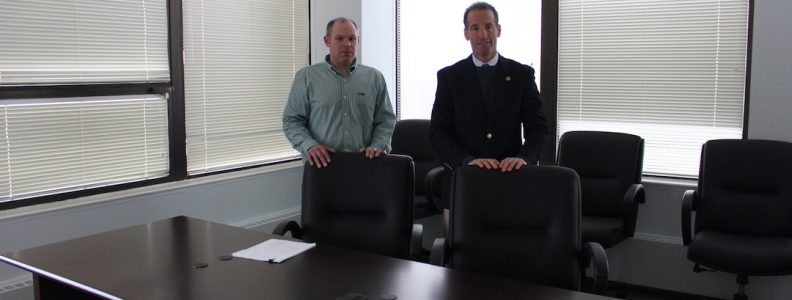
Can I Bring Friends or Family to My Social Security Disability Hearing?
The short answer, according to attorney Doug Landau and the disability team at Abrams Landau, Ltd. is “Yes.”
Just imagine, you have to go in front of the federal administrative law judge. In addition to the judge, and two uniformed guards, there is a vocational expert who is being paid to testify against you. In some cases, there is a psychiatric expert also there to testify that you are not disabled. And, as was recently seen in a West Virginia disability hearing for an Abrams Landau client, there may be a medical doctor, who you can’t even see, on a video screen visible only to the judge, giving evidence against you. Those are not great odds.
The uniformed officers pat you down, use wand metal detectors and you must have government issued ID. Abrams Landau legal assistant Lisa Goldman recently attended a hearing in Martinsburg, West Virginia. She said, “It is very important for our clients to feel at-east heading into the hearing, and much of the environment can be intimidating.”
That is why attorney Doug Landau encourages friends, family and neighbors to accompany clients to their all-important disability hearings. This is not just so that everyone can have a field trip out of the house. Instead, Landau frequently makes use of lay witness testimony, which simply means people talking on your behalf, who are not doctors or other expert witnesses. Ms. Goldman noted, “The vocational expert hired by the federal government testified that this client, who could not function outside her home, could hold jobs as a dishwasher, laundry folder, price marker, sorter and night stocker.” Fortunately, your friends, family and neighbors can give true stories about your disability, which are almost impossible for the judge to cross examine or ignore.
Ms. Goldman emphasized with the witnesses to stay calm, keep their answers brief, but to make sure they understood the questions. In many cases, the lay witnesses have to sit outside until it’s their turn to testify, usually after the disabled client is finished speaking. However, in the case observed in Martinsburg, Ms. Goldman noted that the claimant’s mother and her aunt, with whom she lived with, were both permitted to speak to her disability, as well as her activities around the house. Each “case” is different, but we here at Abrams Landau do our best to ensure that all of our clients are comfortable, confident and prepared for their hearing.
If you or someone you know has any questions about applying for Social Security Disability, please give us a call (703-796-9555) or email us at Abrams Landau, Ltd.
